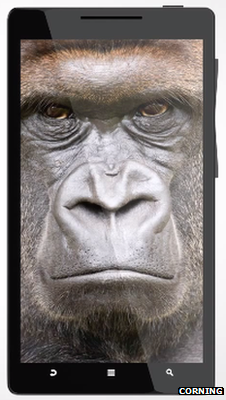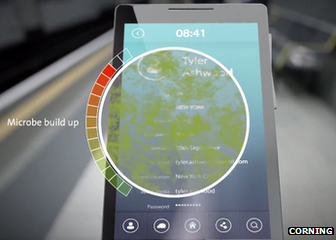CES 2014: Anti-bacteria Gorilla Glass announced
- Published

Corning says its new Gorilla Glass is ready for orders
A new type of touchscreen glass that combats bacteria and fungi has been unveiled.
US firm Corning said its Antimicrobial Gorilla Glass contains ionic silver, a substance that has been used to fight germs for more than 100 years.
The speciality glass-maker said the protection against germs would last for the lifetime of devices that used it.
One components expert said he believed there was a gap in the market for such a product.
"This gives Corning an edge, even if it's a bit of an odd edge," said Bob O'Donnell from the Technalysis Research consultancy.
"There are clearly folks in the world who are very concerned about germs and carry antibacterial hand gel in their pockets.
"If vendors opt to pay extra for this glass I'm sure they will talk about its abilities. But it's likely to be only a small niche of people for whom this would be the deciding factor when choosing between products."
Companies including CaseCrown and S-View already sell anti-bacterial films that can be fitted to tablets and smartphones as an alternative.
Anti-fungal glass
Apple, Amazon, LG, HTC and Samsung are among the many smart device manufacturers to use Corning's products.
Gorilla Glass has become a publicly recognised brand - a rarity for the glass industry - and has generated more than $1bn (£610m) of annual sales for the company.
However, some investors have been concerned that its competitor GT Advanced Technologies might tempt clients away to its sapphire glass, which promises greater scratch resistance.
Corning believes its new product - which it says inhibits the growth of algae, mould, mildew, fungi, and bacteria - gives its customers an extra reason to stay loyal.

Corning says consumers are becoming more aware of how bacteria can exist on touchscreens
"This innovation combines best-in-class antimicrobial function without compromising Gorilla Glass properties," said the firm's senior vice president James Steiner.
Marketing materials for the glass state that: "Thousands of bacteria live on the average mobile device."
However, one microbiologist previously told the BBC that this would not pose a threat to most users.
"Touchscreens are a source of a wide range of microbes, but not much of an issue if you do not share it among other people - since, if you are the only one using it, it's only your germs," said Prof Charles Gerba, a microbiologist at the University of Arizona.
Corning said its new glass was ready to go into high-volume production and that several unnamed tech manufacturers were already testing it.
The firm added that it also intended to market the material to the healthcare, hospitality and transportation industries.